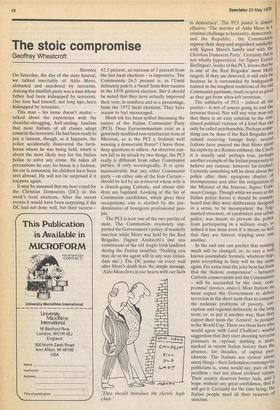The stoic compromise
Geoffrey Wheatcroft
Florence On Saturday, the day of the state funeral, we talked inevitably of Aldo Moro, abducted and murdered by terrorists. Among the smallish party was a man whose father had been kidnapped by terrorists. Our host had himself, not long ago, been kidnapped by terrorists.
This man his name doesn't matter talked about the experience with the shoulder-shrugging, half-smiling fatalism that most Italians of all classes adopt towards the terrorists. He had been ready to pay a ransom, though, as it happens, the police accidentally discovered the farmhouse where he was being held, which is about the most likely way for the Italian police to solve any crime. He takes all precautions he can; his house is a fortress, his car is armoured, his children have been sent abroad. He will not be surprised if it happens again.
It may be assumed that my host voted for the Christian Democrats (DC) in this week's local elections. After the recent events it would have been surprising if the DC had not done well, but their success
42.5 percent, an increase of 5 percent from the last local elections is impressive. The Communists 26.5 percent is, as l'Unita delicately puts it, a 'bend' from their success in the 1976 general election. But it should be noted that they have actually improved their vote, in numbers and as a percentage, from the 1972 local elections. They have reason to feel encouraged.
Much ink has been spilled discussing the nature of the Italian Communist Party (PCI). Does Eurocommunism exist as a genuinely modified non-totalitarian form of Marxism, or is the PC1 a Stalinist wolf wearing a democratic fleece? I leave these deep questions to others. An observer cannot fail to be struck by two things: the PCI really is different from other Communist parties, if only sociologically. It is quite inconceivable that any other Communist party on either side of the Iron Curtain should be led by an aristocrat whose wife is a church-going Catholic, and whose children are baptised. Looking at the list of Communist candidates, which gives their occupations, one is startled by the predominance of bourgeois professional people.
The PCI is now one of the two parties of state. The Communists resolutely supported the Government's policy of masterly inaction while Moro was held by the Red Brigades. (Signor Andreotti's line was reminiscent of the old Anglo-Irish landlord during the Fenian troubles: 'Nothing you may do to my agent will in any way intimidate me'.) The DC poster on every wall after Moro's death bore the simple message, 'Aldo Moro lives in our hearts with our faith in democracy'. The PCI poster is almost effusive: 'The murder of Aldo Moro is a criminal challenge to humanity, democrach and the Republic.. . the Communists express their deep and anguished solidarity with Signor Moro's family and with the Christian Democrat Party'. Certainly this Is not wholly hypocritical, for Signor Enrico Berlinguer, leader of the PCI, knows that he is one of the Red Brigades' most likelY targets. If they are deterred, it will only be because he is surrounded by bodyguards trained in the toughest traditions of the old Communist partisans, ready to give as good as they get from ultra-left terrorists.
The solidarity of PCI indeed all the parties is not of course going to end the terrorist threat. Nor will any wise man saY that there is an easy solution to the continued political violence of a kind that can only be called psychopathic. Perhaps sortie' thing can be done if the Red Brigades are indeed receiving foreign help: several Italians have assured me that Moro spent his captivity in a Roman embassy, the Czech it is usually said: perhaps true, perhaps another example of the Italian propensity to believe any rumour, however far-fetched. Certainly something will be done about the police after their egregious display 01incompetence and after the resignation of the Minister of the Interior, Signor Francesco Cossiga. Though while we sneer at the Italian police forces it should be remembered that they were deliberately designed in a sense, to be incompetent: the fogmented structure, of carabinieri and urban police, was meant to prevent the police from participating in a military coup, as indeed it has done even if it means as well that they are forever tripping over one another.
In the end one can predict that nothing much will be changed; or, to vary a well known journalistic formula, whatever happens everything in Italy will be the same again. For some time the joke here has been that the 'historic compromise' between Catholic conservatism and the Communists will be succeeded by the 'stoic corn" promise' (storico, stoico). Most Italians no
more expect the Government to defeat terrorism in the short term than to conquer
the endemic problems of poverty, cor
ruption and regional defunctity in the long term; or, to put it another way, than they expect their team the 'Azzurri', to prosper
in the World Cup. There are those here who would agree with Lord Chalfont's wistful
suggestion that they start shooting terrorist prisoners in yeprisal; nothing is more marked in recent Italian history than the
absence, for decades, of capital pun
ishment. The Italians are cynical about many things their fathomless contempt for politicians is, some would say, part of the problem but not about civilised values. Their society deserves better luck, and hope, without any great confidence, that II will get it. Certainly for the time being, the Italian people need all their reserves of stoicism.


































 Previous page
Previous page